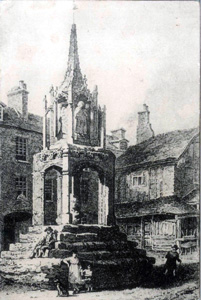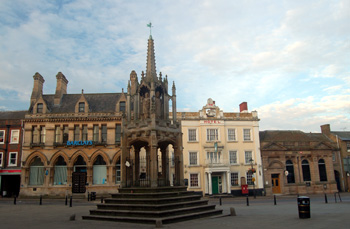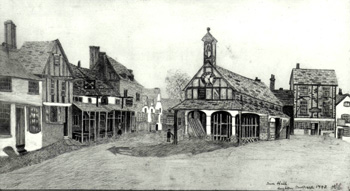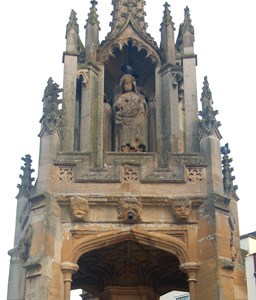
The Market Cross about 1800 [Z1130/72]
Bedfordshire & Luton Archives & Records Service is lucky enough to have some mid 17th century Assizes papers which shed an intriguing light on the misdemeanours that went on at Leighton Buzzard market by way of selling stolen livestock. In May 1668, for example, John Wilson from Northamptonshire stole some cattle from a field in Huntingdonshire and drove them all the way to Leighton Buzzard to sell where, no doubt, he felt they were far enough away not to be recognised [HSA1668/S/49]. Unfortunately the surviving papers do not say how he came to be apprehended.
Joseph Warner of Mogerhanger was charged in December 1677. He was alleged to have stolen three cattle from Richard Humphrey and sold them at Leighton Buzzard market. Warner's defence was that he had agreed to sell them on Humphrey's behalf, as Humphrey "durst not com into the Towne to sell the said Cattle for feare of beinge arrested because hee was in debt" [HSA1678/W/61]. Warner said he sold the cattle for £12/11/-.

High Street and market cross looking south Jun 2008
On 31st August 1679 Richard Knight of Bedford made the following statement [HSA1680/W/80] to William Duncombe, J.P. at Battlesden when charged with sheep stealing: "This Examinant saith that Ellis Knight as she calls herself, is his lawfull wife & that they were married at Naseby in the County of Northampton, that he together with his said wife went a little before harvest into Kent, and workt at Rochester, that about three weekes since he and his said wife came downe to Hockliffe, & lay at the signe of the Unicorne, and then and there left a shirt of his and a smock of his wive's to be washed, & from thence went to Naseby aforesaid to see his wive's friends, from whence he alone went to see his mother liveing at Bedford, on Munday the 25th of Augustt and about three of the clock he went from Bedford towards Layton, and came to Layton on Tuesday the 26th of August where he mett his said wife and a young man a kinsman of hers, who had driven twenty sheep to Layton markett, which his wive's father John Smith a miller of Naseby aforesaid had left her, and sold them there for seaven pounds, and that there are forty sheep more of hers in her brother's custody, whose name he thinks is John Smith, and being asked how she came by them, he said they were left her either by her father or Uncle he could not justly tell which. And this Examinant further saith, that he and his said wife lay at Layton at the signe of the Chequer, and that the next day in the morning he and his said wife and one Nedham went together to Winsloe, whether they came about an houre before sun sett, and that they never parted asunder one step of the way, and that he went thither to buy lace, and being asked what they had to doe for Nedham when they went to buy lace, he answered they carryed him to drive the sheep which he was to have from his wive's friends (at Naseby) to London, then being asked, when he was at Winsloe, and as he pretended was going to Naseby for sheep, why he held not on his journey to Naseby, but came back to Layton, he answered that his wife being ill she had a mind to stay at Hockliffe two or 3 dayes. And he saith the aforesaid Nedham left them at Winsloe, but for what reason this Examinant knoweth not. And further saith that on Thursday in the afternoone he and his wife were comeing towards Layton, that about Swanburne she hapned to be sick, and satt downe in the meadows and for that reason they could not reach Stukely before it was dark, and comeing to a furzey common there lost their way, and wandered all that night till the next morning they came to Layton, and from the time he came from Winsloe, till he came to Layton he was not out of his wive's company: and being asked whether he drove any sheep that night, or had not told his wife he had drove some sheep, he answered he had not drove any, neither had he told his wife so. And further saith not".
His wife was also examined and hardly helped her husband's case as she contradicted it in some parts [HSA1680/W/81]: "This Examinant saith that on Tuesday night last being the 26th of August she and her husband Richard Knight lay at the Chequer in Layton, where the said Richard pickt up William Needham, and from thence on Wensday morning they went all three towards Winsloe in the County of Bucks, whether this examinant was going to buy lace (that being her trade) that her husband and the said Needham went before, for she being not well could not keep pace with them, and that about halfe a mile from the towne of Winsloe they staid for this examinant and then they all three went to the signe of the Boot, and there lay that night, and on Thursday in the evening she this examinant and her said husband left the said Nedham at Winsloe, and that about a mile and an halfe from the said towne, this examinant came on her way towards Layton, and her said husband went crosse over the feilds and the next morning about day he overtook her again, and then this examinant asked her husband where he had been, and he told her he had been for some cheep, but he could not drive them an end, so had left them in a furzey feild by a windmill. And this Examinant being asked if she knew John Gurney of Hockliffe a butcher, said she saw him once on Wensday last at Layton and never before: that on Fryday being the 29th of August she came from Layton to Hockliffe together with her said husband, where they lay at the signe of the Unicorne and from thence they went to the Crosse Keys in Wooburne, where they lay on Saturday night, and that she never was at Hockliffe but that night in her life, upon which being asked, how she came to say before that they went to Hockliffe for some linnen, they had left there to be washed, she made answer, that her husband had left some there before as he came from London, but there was nothing of hers, for she had never been there in her life before. Then this Examinant being asked where she was married to this husband she answered at Rainstrip in the County of Northampton, and some time after denied it again and said she was married at Naseby to this husband, and to her former husband at Rainstrip. And being asked where she had been since she was married, she answered in many places, but particularly they were in Kent and workt at Rochester in harvest, and that she had not been since at Naseby, but afterwards said that about three weekes since they we[nt from] Layton to Naseby to drive her sheep to Layton, but that sh[e came] through Newport, but came neither by Dunstable nor Ho[ckliffe] where she never was before Fryday last in her whole life. And further saith not". It is frustrating not to know the end result.

Town Hall and Market Square in 1798 [Z50/72/38]
John Gurney of Hockliffe, mentioned in the previous statement seems to have been "known to the authorities" at Leighton Buzzard market and, no doubt, more widely, here is a statement of his made on 20th January 1681 [HSA1681/W/44]: "This Examinant saith that on Sunday morning last Roger Jenkens of Chalgrave Labourer, together with one Richard (his sirname he doe not know) came to this Examinant's house in Hookliff, and the said Jenkins did there, together with the said Roger, offer this examinant 4 sheep to be sold, Two were riddled on the back, & two, as he beleives had an S upon the near Buttock they told him that the sheep were part of a drove which passd by that way. He did not aske them how they came by them, He confesses he knew Jenkins to be so poor that he could not purchase suche sheep, But he tooke him that was with him to be a drover, and therefore did not then suspect them to be stoln. Hee killed the 4 sheep the some day, and carried all 4 the next morning by breake of the day to Luton market upon his son's horse, and there sold two sheep & half a one, that he carryd the remaining sheep and halfe by Redbourne and from thence to Markett Street and sold it all but one side. But afterward said he brought the sheep and halfe home to Hockliff on the Munday night and carried them the next day to Red Bourne to sell em there, to gett a ½ penny per pound more than he could get att Laighton markett, that he sold a quarter to one John Catiline att the White Horse att Redbourne a side att the Swane in the same towne, a quarter att the Rose and Crown in the same towne, and brought a side home. Being asked why he bawlked Leighton markett which was held on the same day he carried his Mutton to Redbourne he said because he thought he could sell it better there he desired a warrant to apprehend Roger Jenkins because he was the theife as he now thinks because when he paid downe the money for the 4 sheep (£3 at the rate of 15s per sheep) he the said Jenkins and the aforesd Richard --- divided the money betwixt them and further saith nott". He later added: "He saith further that he kept his markett att Luton in a stall in the shambles over against the stall of William and John Cny Butchers of the said towne and that he sold the 4 skins to the fellmounger of the same whose name is John Dobbin".

Market Cross detail June 2008
The William Cny mentioned in John Gurney's statement turns out to be William Conney of Chesham [Buckinghamshire] who stated in 1684 [HSA1684/W/66] that he bought a brown heifer from one John Green "now a prisoner in His Majesty's gaol in Bedford". He paid £3/13/- at Leighton Buzzard market "and paid Toll for the same heifer, according to the Laws and Statutes of this Realm and the ancient Customs of the aforesaid market". Green had also sold the heifer to a Robert Willison of Newton Longville [Buckinghamshire] but had never delivered it. William Poulton of Battlesden said [HSA1684/W/67] that the heifer was one which had been lost by John Clarke of Potsgrove and that Green has confessed to stealing it. Clarke said HSA1684/W/68] that three cows had been stolen from his pasture and he had heard that they had been sold at Leighton market by John Green from Maidstone [Kent], two were "drove away out of town" and one sold to Robert Willison who had not paid Green before he was taken on suspicion of stealing them. Green himself said HSA1684/W/69] that he bought the cows from a man on the road between Great Brickhill [Buckinghamshire] and Hockliffe for which he paid £9/5/-, unfortunately, he did not know the man's name.
The last tale of duplicity, concerning a stolen horse, took place at Leighton Buzzard Fair in 1684. John Lattimore of St.Albans [Hertfordshire], innholder said [HSA1684/W/83] that he was forced to leave St.Albans due to debt and had known a Thomas Randall, formerly a horse dealer but now maintained by his father, about a year. The two had met a man named Holtham in Holborn [Middlesex] a few days before and they travelled with Holtham towards his estate in Warwickshire. Randall said much the same [HSA1684/W/84] but confessed to calling himself James Ward of Hitchin in the toll book at the fair as a vouchee for Holtham who wanted a horse "but why he entered himself by a wrong name he cannot tell". John Holtham himself said [HSA1684/W/85] that he carried pistols because he was in debt and feared arrest. He had swapped a "brown nag" he had bought from one Mr.Brown of Atherstone in Warwickshire "about ten weeks since" at Aylesbury. He, too, used a false name - Cooke "because his mother married a second husband of that name". It looks as if Holtham tried to get Randall and possibly Lattimore, to vouch for him when buying a horse which, presumably, he would then make off with leaving his vouchee or vouchees to pay the price except, of course he or they had left false identification and intended to disappear before they were caught; obviously things did not work out according to plan.